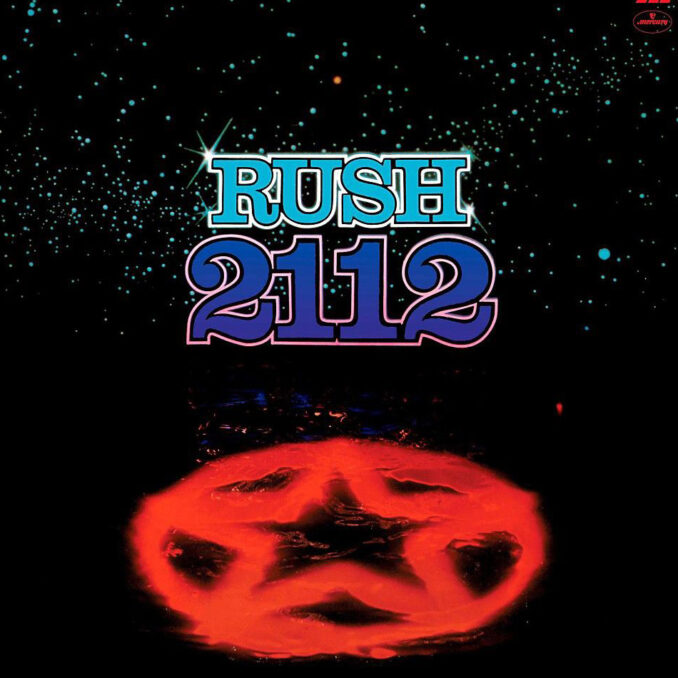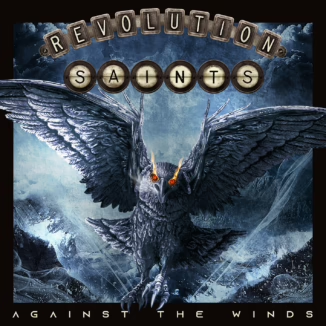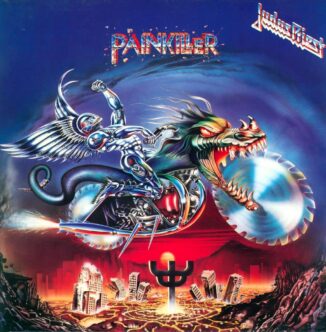
Summary
Mercury
Release date: April 1, 1976
User Review
( votes)“Attention all planets of the Solar Federation. Attention all planets of the Solar Federation. Attention all planets of the Solar Federation. We have assumed control. We have assumed control. We have assumed control.” Thus the foreboding voice, supplied by drummer/lyricist Neil Peart, brings the 7-part “2112” suite to an arresting finish. This 20-minute, 33-second piece, along with five short, eclectic songs, comprise Rush’s classic album 2112, released in March 1976. 2112 is not to be overlooked by anyone who appreciates conceptual depth, hard-edged instrumentation, heartfelt singing, and superior musicianship.
2112 was Rush’s fourth release, and it brought them greater commercial status than their previous effort, Caress of Steel (Mercury, 1975), and earned them headlining gigs. Peaking at 61 in the charts, 2112 went Gold in November 1977, and Platinum in February 1981. It has now achieved Multi-Platinum status in the Canadian trio’s well-deserved 35 million total overall record sales. In recent years, Rush has performed the “2112” suite live, in its entirety (available on Different Stages, Mercury, 1998), and in part (available on various older recordings and more recently on Rush in Rio, Atlantic, 2003). Nearly three decades since the album’s 1976 release, fans still eat it up.
The guitar-centric instrumentation at that point in Rush’s evolution was still relatively simple and on par for that time period. Post-‘80s Rush fans who have been dosed on Geddy Lee’s keyboards might be surprised at the rawness. Alex Lifeson’s electric guitars had a punchy overdrive, but a “drier” amp distortion compared to his “wetter” textural tones of later years. Lee’s lively bass was tight and emphasized midrange, without the grit and percussive attack that he developed later on in his career. Peart’s impeccable drumming, unrelenting in technical precision, embodied finesse and power throughout and reflected a typical rock drum kit of the time, unlike his acoustic/electronic hybrid configurations in later years. Overall, the organic feel actually suits the music nicely. While it is Hard Prog-Rock, the emphasis was on the “Hard.”
Singer/bassist Geddy Lee’s prowess comes from a naturally high-register singing voice that evokes a healthy level of intensity and emotion. Its occasional shrillness may make it less accessible and a bit harsh to the unaccustomed ear, but its edginess and non-sterility contribute to the grandiose aspect of Rush’s musical character, qua Hard Rock. Consumed in full context, the high-pitched vocals play an integral part in creating Rush’s high-spirited musicality. In fact, it is difficult to imagine the plight of the character in 2112 being portrayed in anything less than the style of a wailing banshee. Trivia fans note: the live performances of “2112” mentioned above were played in a key lower (one step) than the original recording … perhaps to show Lee’s 50+ year-old vocal cords mercy over the long sets and tours.
“2112” was Rush’s second extended-length piece (following “Fountain of Lamneth” on Caress of Steel). Peart was compelled to acknowledge in the liner notes the genius of novelist and philosopher Ayn Rand, after writing the tale and realizing the unmistakable parallels between his story and Rand’s novelette Anthem. Both are depictions of the evil of a collectivist society in which a totalitarian State preaches a morality of self-sacrifice of the individual. Many Rush fans are led to discover Ayn Rand’s illuminating philosophy by way of the life-affirming and egoistic sentiments prevalent in Rush’s music, most notably in “2112”: “ . . . the pure spirit of man revealed in the lives and works of this world;” and in “Anthem” on Fly by Night (Mercury, 1975): “I know they’ve always told you / Selfishness was wrong / Yet it was for me not you / I came to write this song.” The artwork introduced on 2112 endured as Rush’s familiar “star man” logo, representing the individual fighting for freedom against mysticism and collectivism.
“2112” begins with “Overture,” a four and a half-minute instrumental that sports the echoing, rhythmic breaks that seemed to be a staple for the band during the ‘70s. Lifeson lays down multiple rhythm guitar parts and a short, but inspired, solo. There is a nod to Tchaikovsky’s “1812 Overture,” and then the biblical quote, “And the meek shall inherit the Earth,” sets the stage for Part II, “The Temples of Syrinx.” Lee assumes the voice of the priests, belting out the collectivist credo of the Federation, over bombastic chordal riffing. Part III, “Discovery,” begins with the precarious tuning of a guitar. A simple, clean guitar part accompanies Lee’s gentle vocal melody, together expressing the wonder and potential of the newfound instrument—“It’s got wires that vibrate.” This segues seamlessly back to full-throttle heavy guitar in Part IV, “Presentation,” in which the music oscillates from soft to heavy to reflect the dialogue between the benevolent individual and the dismissive priests, who reject his discovery. The song rides out with an inspired wah-guitar solo. Part V, “Oracle, The Dream,” maintains the continuity of the storyline but feels somewhat disjointed musically. Fortunately, it’s only two minutes long and is followed by Part VI, “Soliloquy”—the dramatic highlight of the album’s guitar solos and vocals. Properly so, it represents the climax of the individual’s despair at the futility of his life under the Federation, as he now fully realizes what his life could and should be. Lifeson wails on one of his most intense and downright gnarliest solos to-date. Part VII, “Grand Finale,” is a two-minute shred-fest (well, for 1976) that will have your whole life flashing before your eyes.
The album’s additional five songs (on side 2 of the vinyl LP, for those of us who are “classic” enough to relate to LPs) are in the same vein as the songs on Fly by Night and Caress of Steel, but they sound fresh nonetheless. “A Passage to Bangkok” has plenty of Peart’s classic drum fills. “Twilight Zone” is an esoteric trip that provides a break from the heavy guitars. Headphones are recommended on that one for the stereo separation. “Lessons” has a clean, easygoing rhythm that gives way to powerful distorted guitar in the chorus. Lee’s spirited vocals and hip bass lines make it signature Rush. “Tears” is a ballad that unfortunately falls short, due to a thin arrangement that doesn’t do justice to the song’s potential. But the album recovers in a big way with “Something for Nothing,” which is going to make you wish your volume knob went to 11. It’s a heavy close to the album, lyrically the most literal in its theme of freedom and ideals, and musically the most anthemic.
2112 spawned the band’s logo, an issue of the Defenders comic book with an anti-collectivist theme, and a string quartet tribute album. It is undeniably a classic in the Rush catalog and is worthy of a place in anyone’s Progressive Hard Rock collection.




Be the first to comment